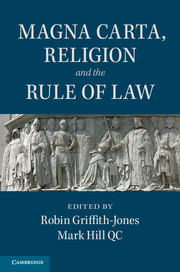Book contents
- Frontmatter
- Contents
- List of contributors
- Preface and acknowledgments
- I Introduction
- II The birth of Magna Carta and the spread of its principles
- III Comparative religious approaches to Magna Carta's rule of law
- 9 Quranic Magna Carta: on the origins of the rule of law in Islam
- 10 Justice in Islamic legislation
- 11 Shariʿa and the rule of law: preserving the realm
- 12 Democracy and the power of religion: some lessons from India
- 13 The still small voice of Magna Carta in Christian law today
- 14 Magna Carta, rule of law and religious diversity
- IV The contemporary inheritance of Magna Carta
- Appendix The Charters in translation
- Bibliography
- Index
13 - The still small voice of Magna Carta in Christian law today
from III - Comparative religious approaches to Magna Carta's rule of law
Published online by Cambridge University Press: 05 May 2015
- Frontmatter
- Contents
- List of contributors
- Preface and acknowledgments
- I Introduction
- II The birth of Magna Carta and the spread of its principles
- III Comparative religious approaches to Magna Carta's rule of law
- 9 Quranic Magna Carta: on the origins of the rule of law in Islam
- 10 Justice in Islamic legislation
- 11 Shariʿa and the rule of law: preserving the realm
- 12 Democracy and the power of religion: some lessons from India
- 13 The still small voice of Magna Carta in Christian law today
- 14 Magna Carta, rule of law and religious diversity
- IV The contemporary inheritance of Magna Carta
- Appendix The Charters in translation
- Bibliography
- Index
Summary
Introduction
The principles in Magna Carta 1215, about due process, lawful judgment by equals, ‘justice, according to law’ and the distinction between ‘just’ and ‘lawful’, all resonate in modern secular constitutional theory and practice about the meaning and importance of the rule of law. People today broadly agree on the value of the rule of law for liberal democracy; but they disagree about its meaning. Three ideas dominate. The first is the formal concept: the rule of law simply requires obedience to law – by government and by citizens –whatever its moral quality. The second is the procedural concept: the rule of law requires law-making to satisfy various minimal moral procedural standards – a legal system does not honour the rule of law if the law itself is not capable of obedience. The third idea is the substantive concept: the rule of law requires that the law itself is just in its respect for human rights; a society whose laws violate principles of justice and humanity does not fulfil the rule of law. So: secular constitutional theory and practice offer a spectrum of rule of law ideas: from ‘power technique’ to ‘political ideal’. What follows explores whether these ideas surface in the internal systems of governance of Christian churches. It examines churches from ten traditions worldwide: Catholic, Orthodox and Anglican; Lutheran and Methodist; Reformed, Presbyterian, Congregational, United and Baptist. The expression ‘the rule of law’ is not commonly used by these traditions in their systems of church governance. But they do have equivalents to all three concepts of the rule of law as they appear in secular constitutional theory and practice.
The formal concept of the rule of law: legality
The formal concept of the rule of law in secular constitutional theory, in its prescriptive form, embraces several familiar principles: the supremacy of regular law; law must be obeyed; the absence of arbitrariness; government action is permissible if authorised by law; no punishment without law; and equality before the law (the equal subjection of government and governed to the law). Above all, these principles require government action to have legal authority.
- Type
- Chapter
- Information
- Magna Carta, Religion and the Rule of Law , pp. 229 - 247Publisher: Cambridge University PressPrint publication year: 2015
- 1
- Cited by



